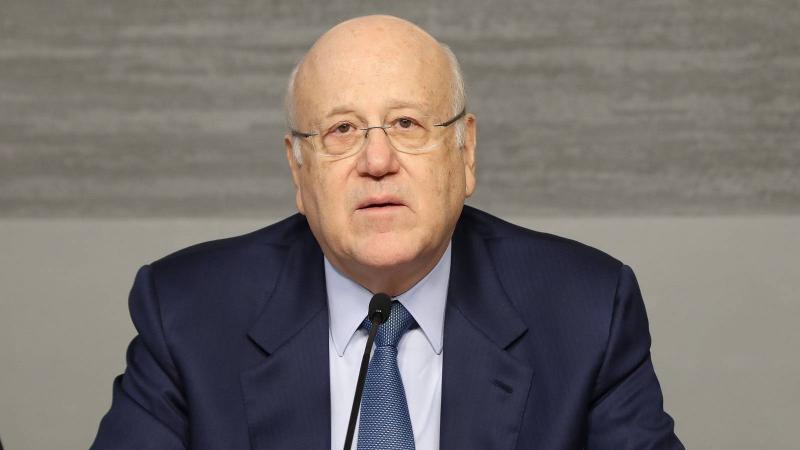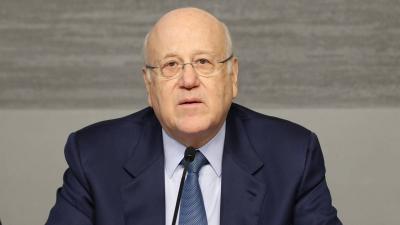Caretaker Prime Minister Najib Mikati affirmed that he is "not in the position to request an extension for the Governor of the Central Bank, Riad Salameh, nor appoint a successor to his position." He pointed out that he "does not want to deepen the rift among the Lebanese or increase the level of division that has peaked with the deadlock surrounding the election of a President of the Republic, as the presidential vacancy has entered its ninth month."
In an interview with "Asharq Al-Awsat," Mikati emphasized that "the assignment of Salameh to manage the affairs of the Central Bank until a successor is appointed by a decree issued by the Council of Ministers is not on his agenda," adding that he "will not cover the extension for Salameh to cut off the accusations that he provides political cover for him under the pretext that he has a personal interest in keeping him at the helm of the Central Bank."
He indicated that "the solution to fill the vacancy in the Central Bank governorship upon the end of Salameh's term lies in applying the law that allows his deputy, Wassim Mansouri, to carry out the tasks assigned to him." He clarified that "if the deputies of the governor resign, Finance Minister Youssef Khalil will ask them to continue managing the public facility, which also applies to the Central Bank."
Mikati continued: "Anyone with another solution should present it; as for me, I will not nominate any name to succeed Salameh." He noted that "he will not be lured into engaging in populist bidding with any party," stating, "I did not hesitate for even a moment to withdraw my decision to form a security-judicial committee to look into the border disputes among several towns following the tragic incident in the Qurnat al-Sawda that resulted in the death of two young men from the town of Bsharri."
He considered that the media and political campaign targeting him had no justification and that he aimed to contain any attempts to drag the region into sectarian strife, despite the fact that a similar committee was formed during the tenure of former Prime Minister Saad Hariri, with his actions limited to including a representative from the Ministry of Justice in the committee.
Mikati expressed astonishment at the political and media campaigns that deal with the vacancy in the presidency, and later in the governorship of the Central Bank, "as if the responsibility falls on the caretaker government, which obstructs the election of a president, although it primarily and ultimately lies with the parliamentary blocs that remain divided among themselves." He stated: "Enough injustice to the government."
He added: "There is no solution to the accumulating crises that weigh heavily on the Lebanese other than electing a president today before tomorrow, because his election will spare the country further exhaustion on all levels." Mikati questioned, "Why are they blaming the government for all these problems when they know full well that the mandatory path to find solutions to the crises remains in electing a president?" He pointed out that the accusations of the government being responsible for the collapse do not entail self-reflection from those making such accusations about their roles in impeding governmental work while the election of a president is complicated, and thus it is unjust to place the blame on the government even though responsibility lies with those obstructing the election on the other hand.
Mikati's office stated that "the law stipulates that the first deputy governor will assume the duties of the governor until a new governor is appointed." It added, "The law does not stipulate a vacancy, and institutions continue their work through the first deputy governor and the other remaining deputies." He explained, "The crucial thing is to avoid a vacancy in the Central Bank because it is the financial nerve in the country."
One of the four deputy governors of the Central Bank informed Reuters that they are contemplating resigning together if a successor is not appointed, which increases the likelihood of a vacancy in the governor's position amid a deep financial crisis. The efforts to find a successor for Salameh are complicated by the collapse of governance systems and rising political tensions in the country. Typically, the President of the Republic appoints the Governor of the Central Bank, but the Parliament has not yet elected a successor to former President Michel Aoun, whose term ended in late October.
On Monday, Parliament Speaker Nabih Berri stated, "Necessities permit the prohibitions," indicating that the caretaker government should appoint a governor for the bank. However, he added, "I will respect what the Prime Minister announced in this regard regarding no appointments or extensions."
Many Lebanese hold Salameh and the long-standing ruling elite responsible for Lebanon's financial collapse. Salameh claims he is a scapegoat for the collapse that followed decades of corruption and extravagance by politicians. For years, Salameh remained very close to power. Mikati defended Salameh in late 2021, stating that he should remain in his position even as investigations began against him regarding illicit gains. He added that no one changes their officers during wartime. However, recently, Salameh appears to be in growing isolation.
Salameh's term ends on July 31.




